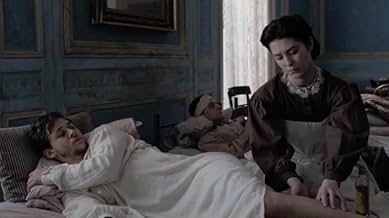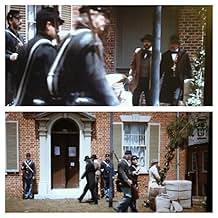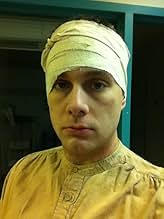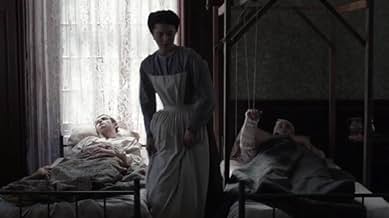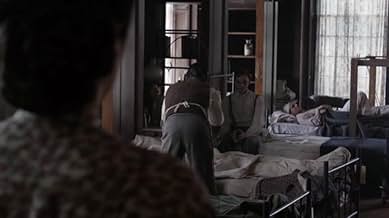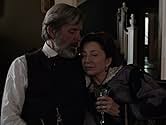VALUTAZIONE IMDb
7,5/10
3072
LA TUA VALUTAZIONE
Segue le vite di due infermiere volontarie su fronti opposti della guerra civile, l'abolizionista del New England Mary Phinney e la sostenitrice confederata Emma Green.Segue le vite di due infermiere volontarie su fronti opposti della guerra civile, l'abolizionista del New England Mary Phinney e la sostenitrice confederata Emma Green.Segue le vite di due infermiere volontarie su fronti opposti della guerra civile, l'abolizionista del New England Mary Phinney e la sostenitrice confederata Emma Green.
- Premi
- 1 vittoria in totale
Sfoglia gli episodi
Recensioni in evidenza
This series is unique for presenting the ambivalence and contradictions of the Civil War Era. The protagonist nurse is a staunch abolitionist who is made to accept the need to also help Confederate wounded by a doctor who is loyal to the Union and thus a traitor to his slave- owning pro-Confederate Maryland family. Nevertheless he is unmoved by abolitionist sentiments--until he meets a free black Philadelphia man he admires.
The head of the Southern family that owns the hotel-turned hospital works to save his holdings and business interests while not betraying his Southern loyalties. He opposes efforts by Union soldiers to enforce claims to return runaway slaves (seems unhistorical here set in 1862- -I thought the Union stopped returning "contraband" in 1861.)
The African-American characters debate the merits of freedom versus the security of slavery or of employment not much removed from slavery.
In short, the moral certainties of hindsight are removed and the characters must struggle in their contemporary context. I do enjoy that.
Some casting choices were surprising but they all work.
The head of the Southern family that owns the hotel-turned hospital works to save his holdings and business interests while not betraying his Southern loyalties. He opposes efforts by Union soldiers to enforce claims to return runaway slaves (seems unhistorical here set in 1862- -I thought the Union stopped returning "contraband" in 1861.)
The African-American characters debate the merits of freedom versus the security of slavery or of employment not much removed from slavery.
In short, the moral certainties of hindsight are removed and the characters must struggle in their contemporary context. I do enjoy that.
Some casting choices were surprising but they all work.
"Mercy Street" takes place at the start of the Civil War, in a Union Hospital in Alexandria, Virginia, where a newly appointed "head nurse" must contend with multiple issues in her attempt to organize services. There are all sorts of problem she must confront – how to care for Confederate troops in a Union hospital, how to deal with slaves and freed Blacks, the rivalries between different types of nurses, the hierarchical relationship with Physicians, the influence of European medicine, etc.
The settings are marvelous as are the costumes. The acting is very good, especially from head nurse and ardent abolitionist Mary Elizabeth Winstead and Confederate volunteer Hannah James. TV Stalwarts Gary Cole, Peter Gerety, and Cherry Jones are on hand as well. At times modernism creep into the dialogue, as well as the mannerisms, but generally speaking it has an authentic mid 19th Century feel. There is also some failings in the accents which seem to range all over the place, even among family members.
The first two episodes manage to keep the soap opera elements at a minimum while showing us what it must have been like to be a part of the process. This show is entertaining while it is simultaneously educational. It won't appeal to everyone, but anyone interested in Medicine, or the Civil War, will find it compelling.
The settings are marvelous as are the costumes. The acting is very good, especially from head nurse and ardent abolitionist Mary Elizabeth Winstead and Confederate volunteer Hannah James. TV Stalwarts Gary Cole, Peter Gerety, and Cherry Jones are on hand as well. At times modernism creep into the dialogue, as well as the mannerisms, but generally speaking it has an authentic mid 19th Century feel. There is also some failings in the accents which seem to range all over the place, even among family members.
The first two episodes manage to keep the soap opera elements at a minimum while showing us what it must have been like to be a part of the process. This show is entertaining while it is simultaneously educational. It won't appeal to everyone, but anyone interested in Medicine, or the Civil War, will find it compelling.
I'm not sure why any viewer would compare a series set during American revolutionary times (the Civil War) to Downton Abbey. Downton Abbey was simply a remake of the popular (and recently remade) series, Upstairs, Downstairs. It was mostly an entertaining soap about a rich family and their household, but I digress...
First off, all of the actors are well-cast and do suitably good work. It's only been two episodes, so we'll have to wait and see as far as whether any heavy lifting will be required, acting wise. It's safe to say that we should expect to see the transformation of some of the characters, insofar as their beliefs are portrayed. There is a doctor, for example, who has no problem with slavery, but believes that it is his duty to equally treat Union and Confederate soldiers because, "Blood does not run grey or blue, it runs red." The nurse to whom he makes this argument (Nurse Mary/Baroness), is a staunch supporter of the Union and believes that as a Union hospital, Union soldiers can claim priority.
We have familiar faces in this cast - L. Scott Caldwell, Donna Murphy, Gary Cole, Tara Summers, and new ones in Shalita Grant, McKinley Belcher III, and Mary Elizabeth Winstead. While Mercy Street bears some similarity to The Knick due to its setting (a hospital) and a promise of change to come, it is less graphic in its portrayal of the everyday occurrences of the medical world.
With the popularity of Hamilton on today's Broadway stage, Mercy Street is a welcome addition to the TV lineup, as anything that encourages today's American to learn about the past is a boon, indeed.
First off, all of the actors are well-cast and do suitably good work. It's only been two episodes, so we'll have to wait and see as far as whether any heavy lifting will be required, acting wise. It's safe to say that we should expect to see the transformation of some of the characters, insofar as their beliefs are portrayed. There is a doctor, for example, who has no problem with slavery, but believes that it is his duty to equally treat Union and Confederate soldiers because, "Blood does not run grey or blue, it runs red." The nurse to whom he makes this argument (Nurse Mary/Baroness), is a staunch supporter of the Union and believes that as a Union hospital, Union soldiers can claim priority.
We have familiar faces in this cast - L. Scott Caldwell, Donna Murphy, Gary Cole, Tara Summers, and new ones in Shalita Grant, McKinley Belcher III, and Mary Elizabeth Winstead. While Mercy Street bears some similarity to The Knick due to its setting (a hospital) and a promise of change to come, it is less graphic in its portrayal of the everyday occurrences of the medical world.
With the popularity of Hamilton on today's Broadway stage, Mercy Street is a welcome addition to the TV lineup, as anything that encourages today's American to learn about the past is a boon, indeed.
I had high hopes for Mercy Street. Fictionalized history has become increasingly popular in recent years, and this show had potential to be one of the more memorable ones, with a previously untapped setting and a cast full of talented actors. Sadly, the show has turned out to be mostly unremarkable.
The basic premise is simple: a widowed woman is sent to become head nurse at a military hospital converted from a hotel in Union-occupied Alexandria, Virginia. On top of this premise, the show's writers have piled enough dramatic crises and neurotic characters to populate a full soap opera. Everyone is constantly shouting at each other and plotting behind each other's backs.
Given the setting, conflict and friction is understandable, and of course a drama needs, well, drama. But with only six episodes, they've created enough plot lines to easily fill a US-standard 22-episode season, if not more. Everything is just so busy that the only way we learn anything about the characters is through their conflicts. Calm moments are few and far between. Most performances border on scenery- chewing, except of course when they jump well past that border.
That said, there are a number of things to enjoy. Mary Elizabeth Winstead, always a treat, seems so comfortable with the trappings of the period you'd think she was born into it. Donna Murphy is exquisite as the quintessential Southern matriarch, turning borderline overacting into a virtue. Tara Summers has channeled all the snarky disdain of Alan Rickman while Jack Falahee is the spitting image in looks and charm of a young Johnny Depp. Gary Cole, one of the few cast members not constantly gnaw at the walls, adds just enough temper to his usual near-deadpan dryness to be a realistic Southern businessman trying to hold onto what little he has left after the Union takes everything.
The real surprise, though, is Josh Radnor. If you've only seen him in How I Met Your Mother, you'd have no idea that he's capable of the quietly powerful performance he turns in here. Yes, he does spend a lot of time chomping on the set, but he balances that with more subtle moments that reveal significant talent he hasn't had much opportunity to utilize. In many ways, he reminds me of Mandy Patinkin in his younger days.
Ultimately, the show is entertaining enough to be worth watching if you like fictionalized history. Just don't expect more from it than it is.
The basic premise is simple: a widowed woman is sent to become head nurse at a military hospital converted from a hotel in Union-occupied Alexandria, Virginia. On top of this premise, the show's writers have piled enough dramatic crises and neurotic characters to populate a full soap opera. Everyone is constantly shouting at each other and plotting behind each other's backs.
Given the setting, conflict and friction is understandable, and of course a drama needs, well, drama. But with only six episodes, they've created enough plot lines to easily fill a US-standard 22-episode season, if not more. Everything is just so busy that the only way we learn anything about the characters is through their conflicts. Calm moments are few and far between. Most performances border on scenery- chewing, except of course when they jump well past that border.
That said, there are a number of things to enjoy. Mary Elizabeth Winstead, always a treat, seems so comfortable with the trappings of the period you'd think she was born into it. Donna Murphy is exquisite as the quintessential Southern matriarch, turning borderline overacting into a virtue. Tara Summers has channeled all the snarky disdain of Alan Rickman while Jack Falahee is the spitting image in looks and charm of a young Johnny Depp. Gary Cole, one of the few cast members not constantly gnaw at the walls, adds just enough temper to his usual near-deadpan dryness to be a realistic Southern businessman trying to hold onto what little he has left after the Union takes everything.
The real surprise, though, is Josh Radnor. If you've only seen him in How I Met Your Mother, you'd have no idea that he's capable of the quietly powerful performance he turns in here. Yes, he does spend a lot of time chomping on the set, but he balances that with more subtle moments that reveal significant talent he hasn't had much opportunity to utilize. In many ways, he reminds me of Mandy Patinkin in his younger days.
Ultimately, the show is entertaining enough to be worth watching if you like fictionalized history. Just don't expect more from it than it is.
I am greatly enjoying this series. The production has the feel of the period from the mud in the streets, to the period decor of the rooms and costumes, all the way to the amputated limbs being taken away in a wheelbarrow. War is hell, and none was more so than the Civil War, when weaponry had become so efficient as to mow down regiments marching forward in outdated styles of battle. Some viewers might object to bloody surgery scenes. However, one of the most affecting scenes to me was of a Confederate soldier with shell shock who told of the horror of battle, "the smoke and blood and the screaming, you never know where it's coming from."
Soldiers who make it to this hospital are cared for to the best of their abilities by Mary Phinney and Dr. Jedediah Foster, played admirably by Mary Elizabeth Winstead and Josh Radnor. Their own personal dramas are interwoven into the story lines quite well. Applause to the producers and directors!
Soldiers who make it to this hospital are cared for to the best of their abilities by Mary Phinney and Dr. Jedediah Foster, played admirably by Mary Elizabeth Winstead and Josh Radnor. Their own personal dramas are interwoven into the story lines quite well. Applause to the producers and directors!
Lo sapevi?
- QuizThe real Alice Green actually died a few weeks short of her 15th birthday in early 1860, over a year before the start of the Civil War.
I più visti
Accedi per valutare e creare un elenco di titoli salvati per ottenere consigli personalizzati
- How many seasons does Mercy Street have?Powered by Alexa
Dettagli
- Data di uscita
- Paese di origine
- Siti ufficiali
- Lingua
- Celebre anche come
- Улица милосердия
- Luoghi delle riprese
- Laburnum House - 1300 Westwood Avenue, Richmond, Virginia, Stati Uniti(Mansion House Hotel)
- Aziende produttrici
- Vedi altri crediti dell’azienda su IMDbPro
Contribuisci a questa pagina
Suggerisci una modifica o aggiungi i contenuti mancanti




